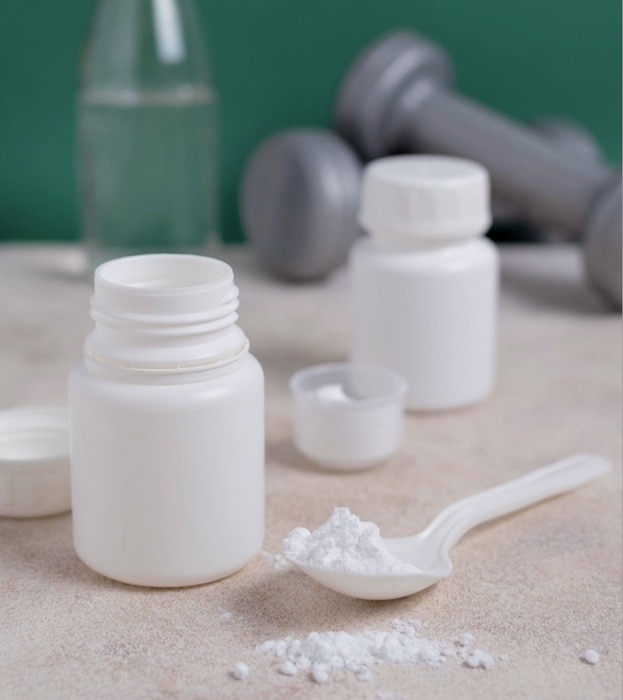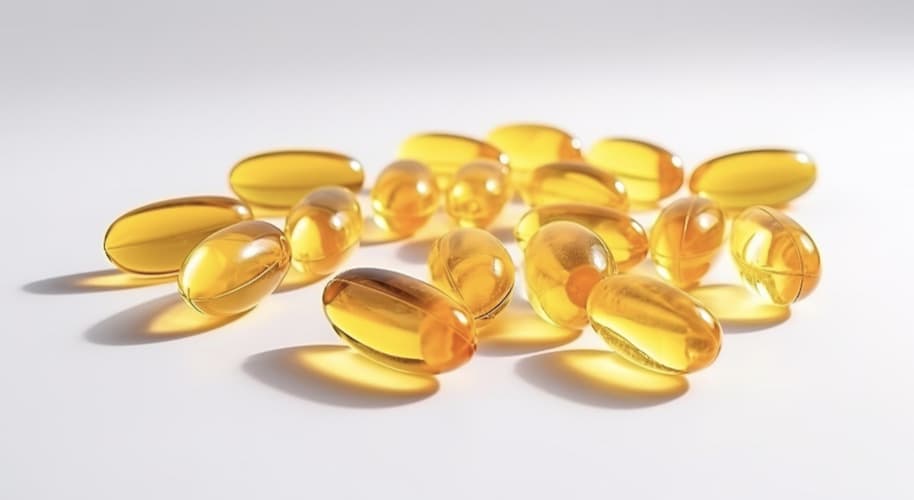Contents
- Lion’s Mane Mushroom
- Bacopa Monnieri
- L-Tyrosine
- ALCAR (Acetyl-L-Carnitine)
- Creatine
- SAM-e (S-Adenosylmethionine)
- Phosphatidylserine (PS)
- Ginkgo Biloba
- Alpha-GPC
- Gotu Kola
- Red Coffee Berry Fruit
- Omega-3 (DHA, EPA, ALA)
- Huperzine A
- Lecithin
- Cistanche Deserticola
- Guarana
- Taurine
1. Lion’s Mane Mushroom
Lion’s Mane mushroom (Yamabushitake, Hericium erinaceum) has over centuries been used in China and Japan, both a culinary food and as a traditional medicine. It is a large, white, and hairy mushroom, so it is no wonder it got its name from the likeness to a lion’s mane (1).
More recently there has been a renewed interest in the mushroom as new research has emerged that show a range of health benefits from on the brain and body. Particularly fascinating are the nootropic effects of lion’s mane mushroom for improving cognitive performance. One of the findings is that lion’s mane increases the production of enzymes that promote Nerve Growth Factors (NGF) (2).
Nerve Growth Factor is a neuropeptide and a neurotrophic factor that is involved maintaining and in regulating the growth of neurons. The release of NGF not only stimulates memory formation and recall, but it also has a positive effect on mood and in reducing anxiety (3).
Mental functioning decline as we grow old, which may occur as the brain’s ability to form new connections and grow new neurons decline (4). Studies suggest that lion’s mane mushrooms contains at least two compounds that stimulate the growth of new brain cells: erinacines and hericenones (2).
Additionally, animal studies have found that lion’s mane may help protect against Alzheimer’s disease, a degenerative brain disease that causes progressive memory loss. In fact, lion’s mane mushroom extracts have been shown to reduce symptoms of memory loss in mice, as well as prevent neuronal damage caused by amyloid-beta plaques, which accumulate in the brain during Alzheimer’s disease (5), (6), (7).

Igelstachelbart (Hericium erinaceus) by Lebrac / Creative Commons
Benefits
May Modulate the Inflammation Behind Alzheimer’s Disease
More recent studies have examined if Lion’s mane mushroom is beneficial for treating Alzheimer’s disease in humans by modulating the inflammation behind the build-up amyloids (8). One study found that a daily supplementation of merely 3 gram lion’s mane mushroom for 16 weeks improved mental functioning significantly in older adults with mild cognitive impairment. Moreover, 4 weeks after the termination of supplementation the scores decreased significantly (9).
Helps Relieve Mild Symptoms of Depression and Anxiety
Several studies have implicated chronic inflammation as a key contributing factor in depression and anxiety. A small double-blind study in Japan investigated the clinical effects of lion’s mane mushroom on depression, menopause, sleep quality on women during 4 weeks and reported significant improvements in the group that were administered supplements with lion’s mane (3).
Other animal research find that supplementation with the substance amycenone found in lion’s mane mushroom can reduce depression and anxiety due to its anti-inflammatory effect (11), (12).
Animal studies have found that lion’s mane extract can regenerate brain cells and improve the functioning of the hippocampus, which in turn affect memory formation and emotional response. The results indicate that chronic administration of lion’s mane mushroom can exert antidepressant and anxiolytic effects possibly from hippocampal neurogenesis (13), (14).
May Speed Recovery from Nervous System Injuries
The nervous system consists of the brain, spinal cord and other nerves that travel throughout the body. These components work together to send and transmit signals that control almost every bodily function. Injuries to the brain or spinal cord can be devastating. They often cause paralysis or loss of mental functions and can take a long time to heal.
Research find that lion’s mane mushroom extract may speed the recovery from brain or spinal cord injuries – that cause paralysis and loss of cognitive functions – by stimulating the growth and repair of nerve cells (15), (16), (17).
May Protect from Stomach Ulcers
Ulcers are capable of forming anywhere along the digestive tract, including the stomach, the small- and large intestine. Ulcers are commonly caused by two factors: damage to the mucous layer of the stomach from the extended use of pain medication, such as non-steroidal anti-inflammatory drugs (NSAIDs), and by the excessive growth of the bacteria H. pylori due to unhealthy eating habits (18).
Lion’s mane extract may protect against the development of stomach ulcers by inhibiting the growth of H. pylori and thus protecting the stomach lining from damage (19), (20).
Decreasing Heart Disease Risk Factors
High triglycerides, cholesterol, and obesity are all central risk factors in heart disease and studies show that lion’s mane extract has a beneficial effect on each of them.
An in vitro study finds that lion’s mane improves fat metabolism and lowers triglyceride levels (21). Research also show that lion’s mane extract may prevent the oxidation of cholesterol in the bloodstream (22). The problem with oxidized cholesterol molecules is that they tend to attach to the walls of arteries, which results in hardened walls and an increased risk for heart attack and stroke. Lion’s mane mushroom also contains hericenone B which has been found to decrease blood clotting and thus lowering the risk of heart attacks and stroke (23).
May Decrease the Risk for Diabetes
Diabetes occurs when the body loses the ability to control blood sugar levels. This results in the blood sugar levels being consistently and chronically elevated, which eventually results in kidney disease, vision loss, and nerve damage to the hands and feet.
Lion’s mane mushroom can be useful in managing diabetes by improving blood sugar control. Animal studies report that lion’s mane mushroom can reduce blood sugar levels significantly in normal and diabetic mice even at very low doses (6 mg/kg) (24), (25). Lion’s mane reduces the levels by inhibiting the activation of the alpha-glucosidase enzyme, which is breaking down carbohydrates in the small intestine (26). When the alpha-glucosidase enzyme is blocked the intestine cannot digest and absorb carbohydrates as efficiently, which naturally lowers blood sugar levels.
May Decrease the Risk for Certain Cancer Types
Cancer means that the DNA has become damaged, which results in cells beginning to divide and replicate at an accelerated rate. Lion’s mane contains distinct substances that may help fight cancer (27), (28). Test-tube studies have found that human cancer cells mixed with lion’s mane extract results in the cancer cells dying at a faster rate, including liver, stomach, blood, and colon cancer cells (29), (30), (31).
Yet another study of mice with colon cancer reported that lion’s mane extracts reduced the spread of the cancer to the lungs by 69% (32). Studies of mice have also showed that lion’s mane extracts have been more effective than regular cancer medications in slowing tumor growth, while also having fewer side-effects (30).

Hericium erinaceum on an old tree in Shave Wood, New Forest, U.K. by Jim Champion / Creative Commons
Side-effects
Not enough is known about the use of Hericium erinaceus in medicinal amounts during pregnancy and breastfeeding. Stay on the safe side and avoid using the supplement during pregnancy and while breastfeeding.
May slow blood clotting. This might increase the chances bleeding in people with bleeding conditions.
May lower blood sugar. Watch for signs of low blood sugar (hypoglycemia) and monitor your blood sugar carefully if you have diabetes.
Useful Sources
2. Bacopa Monnieri
Bacopa monnieri, also known as Brahmi, is a member of the snapdragon family of plants and also called water hyssop. Brahmi has calming properties and is used to reduce stress and nerve tension in addition to being used to treat Alzheimer’s disease. It also promotes emotions of tranquility and reduces restlessness. Brahmi is used to heal stomach ulcers and irritable bowel syndrome and boosts mucus production in the digestive tract. Additionally, it helps the liver function. Brahmi is taken in a dose of standardized extract of 300 milligrams to 450 milligrams per day, according to the University of Michigan Health System.
The Indian system of traditional medicine known as Ayurveda has traditionally used the herb bacopa (Bacopa monnieri). The benefits of bacopa as a treatment for thyroid health, anxiety, and memory issues are extensively publicized. However, not all of these benefits are supported by scientific evidence. Bacopa is also referred to as andri, Bacopa monnieri, herb of grace, herpestis herb, Herpestis monniera, Indian pennywort, and water hyssop.

Bacopa monnieri herb is small flower
Benefits
Contains Antioxidant Compounds Such as Bacosides and Bacopasides
Preliminary evidence suggests that bacopa may have antioxidant properties. The herb includes saponin substances including bacosides and bacopasides that may improve the flow of brain chemicals involved in cognition, learning, and memory as well as reduce inflammation in the brain.
Few research have, however, examined the potential health benefits of bacopa to date. The treatment and/or prevention of a number of health issues has been the main focus of previous research.
Memory and Brain Function
Numerous research suggest that bacopa may improve cognitive performance and retain memory. The impact of bacopa on cognitive performance was examined in nine previously published studies, according to a report that was published in the Journal of Ethnopharmacology in 2014. Bacopa has the potential to enhance cognition, according to the study’s findings, but larger, carefully planned trials contrasting the supplement with pharmaceuticals are required.
An earlier study that examined existing research on the effects of bacopa on cognitive function discovered some evidence that the herb extract might enhance memory during free-recall tests. In a 2016 study involving 60 college students, researchers discovered that bacopa (300 mg twice day) treatment resulted in improvements on cognitive function tests after six weeks.
Anxiolytic and Calming
Studies indicate that bacopa may assist change the activity of specific stress-related enzymes, suggesting that bacopa may help the brain prepare for dealing with stress. One tiny study examined the benefits of a bacopa extract on healthy participants performing several tasks, and it was published in Phytotherapy Research in 2014. Researchers discovered that bacopa users had improved cognitive function, some favorable mood impacts, and lower cortisol levels.
Currently, there is insufficient scientific data to establish a suitable dose range for the supplement. Doses are normally determined by a number of variables, such as your age, gender, and present state of health.
Side-effects
When used as recommended and under the care of your doctor, brahmi is regarded as safe. Despite not making you drowsy like gotu kola does, brahmi can nevertheless make you feel sick, make your mouth dry, and make your muscles tired. If you are expecting or breast-feeding, avoid taking brahmi. Brahmi should not be taken by women who are using oral contraceptives or hormone replacement treatment since it interacts with excess estrogen and short-term hearing loss.
If you have a thyroid condition, avoid using brahmi because it can raise thyroid hormone levels and conflict with thyroid treatments. Research on the herb’s interactions with drugs, including those that affect neurotransmitters, is lacking. However, interactions with pharmaceuticals that are altered by the liver, Alzheimer’s treatments, anticholinergic drugs, cholinergic drugs, acetylcholinesterase inhibitors, or thyroid hormones may also happen.
Overall, bacopa’s potential side effects include weariness, dry mouth, nausea, stomach cramps, bloating, diarrhea, and increased bowel movements. One clinical investigation suggests that bacopa may also raise blood calcium levels.
Remember that it has not been determined whether supplements are safe for use by nursing women, kids, and people with medical issues. Since there are no studies on the safe use of bacopa during pregnancy, pregnant women should avoid taking it. According to studies on animals, bacopa may lower fertility.
Useful Sources
Bacopa monnieri – Verywell Health
Bacopa: Health Benefits, Uses, Side Effects, Dosage – RxList
Bacopa: Uses, Side Effects, Interactions, Dosage, and Warning – WebMD
Bacopa monnieri Supplement — Health Benefits, Dosage – Examine
3. L-Tyrosine
L-Tyrosine is necessary for creation of the neurotransmitters epinephrine (adrenaline), norepinephrine, dopamine, and thyroid hormone all depend on the non-essential amino acid l-tyrosine. Moreover, L-Tyrosine supports healthy glandular function and stress response.
L-tyrosine is frequently used to enhance memory, focus, and alertness under pressure. The body uses tyrosine to make chemical messengers that are involved in conditions involving the brain such as mental alertness. L-tyrosine advantages may include preventing weight gain, depression, weariness, and impaired cognitive function overall.
Benefits
Possibly enhance mental performance and focus. Tyrosine supplements affect mental performance under pressure, according to research. These include stress caused by the cold or stress caused by noise.
May help to improve memory. Tyrosine supplements have been shown to enhance memory under pressure. These include cold-induced stress or multi-tasking. One study found that tyrosine significantly enhanced accuracy and decreased frequency of list retrieval on the working memory task during the multiple task battery.
Improve alertness following loss of sleep. People who have missed a night of sleep can stay alert for an additional three hours by taking tyrosine. Additionally, preliminary research suggests that tyrosine improves memory and thinking in those who are sleep-deprived. There is some proof that increasing your tyrosine intake can enhance your mood, alertness, stress-coping skills, and general cognitive performance. According to one study, it is helpful when soldiers are subjected to physical stressors, such as those that are relevant to the military, such exposure to cold stress, high-altitude stress, or prolonged wakefulness.
May help for depression. Tyrosine affects dopamine and adrenaline levels, which control your reward and pleasure centers and your “fight-or-flight response” under stress, respectively. Catecholamines are released more readily in stressful situations, which may lower their concentrations. L-Tyrosine can aid in restoring the levels. People who are under a lot of stress or who are depressed may find that increasing their intake of this amino acid is beneficial because symptoms like irritability, weariness, and moodiness tend to worsen when dopamine and norepinephrine levels fall.
May support weight loss. No particular research have been done, according to University of Michigan Medicine, to prove that L-tyrosine aids in weight loss promotion. However, there is some evidence that it may aid in fat loss in overweight individuals when combined with other naturally occurring fat-burning chemicals like cayenne, green tea, and caffeine, but only modestly. In a 2007 study, overweight persons who also took tyrosine, capsaicin, catechins, and caffeine saw a very slight weight loss of about 0.9 kg.
May help for withdrawal symptoms. Dopamine fluctuations have been shown to make people more susceptible to addictions. Low levels might make it difficult to start or finish work, cause sadness, impair focus, sap your energy, and make you unmotivated. Alcohol, drug usage, smoking, gambling, and overeating are examples of addictive habits. Tyrosine, when combined with the medicine naltrexone, may help manage the symptoms of alcohol and heroin withdrawal as well as reduce alcohol consumption, according to ongoing study. Tyrosine, 5-hydroxytryptophan (HTP), phosphatidylcholine, and L-glutamine appear to have the greatest positive benefits on mood and sleep in individuals addicted to heroin and alcohol, possibly because they assist balance catecholamine levels.
Side-effects
When used by adults as a medication, either temporarily or topically, tyrosine is probably safe. When consumed orally (in amounts up to 150 mg/kg per day for up to 3 months), tyrosine appears to be safe. Some people report having adverse symptoms like heartburn, fatigue, nausea, and headaches. Tyrosine use during pregnancy and breast-feeding is not known to be safe at this time due to a lack of information. Tyrosine supplementation may lead to an excessive rise in thyroxine levels, aggravating Graves’ illness and hyperthyroidism.
4. ALCAR (Acetyl-L-Carnitine)
Acetyl-L-Carnitine and L-carnitine are both converted by the body in to each other, where L-carnitine is non essential amino acid. Acetyl-L-carnitine assists the body in a number of functions, from producing energy, muscle movement, and many other body processes, such the heart and brain function. Acetyl-L-carnitine has been treated such that it may easily cross the blood-brain barrier and is believed to improve brain health and memory.
For a range of illnesses, including Alzheimer’s disease, age-related memory loss, depression, thinking issues linked to alcoholism, thinking issues linked to Lyme disease, and thinking issues linked to very bad liver function, people take acetyl-L-carnitine orally (hepatic encephalopathy). It is also used to treat other conditions such alcohol withdrawal, Down syndrome, bipolar disorder, inadequate brain blood flow following a stroke, cataracts, nerve pain from diabetes, nerve pain from medications used to treat AIDS or cancer, sciatic nerve pain, fibromyalgia, and facial paralysis.

ALCAR (Acetyl L-Carnitine) Power
Benefits
Increases endurance. L-carnitine is a crucial component of energy generation, thus many people utilize it to improve energy levels and endurance during bodybuilding and athletic competition. Giving professional soccer players three to four grams of L-carnitine before training was found to increase the amount of time it took for them to become exhausted in a study from Turkey that was published in the Journal of Strength and Conditioning Research. Likewise, rats were given L-carnitine in an animal study from India that was published in the journal Wilderness & Environmental Medicine and shown an increase in exercise endurance. For this reason, supplementing with this amino acid may especially benefit endurance athletes, such as long-distance runners, swimmers or cyclists.
Enhancing weight loss. According to several research, taking supplements can actually be a successful approach to accelerate weight loss when used in conjunction with a healthy diet and regular exercise. A study from Iran that examined the findings of nine different trials indicated that adding carnitine to the diet dramatically increased weight reduction and reduced body mass index when compared to a control group. However, the effects of L-carnitine on weight loss may differ, and other research have produced contradictory findings. For instance, in an Australian trial that was published in the International Journal of Sports Nutrition and Exercise Metabolism, 36 obese women underwent eight weeks of aerobic exercise while taking either L-carnitine or a placebo. Researchers came to the conclusion that L-carnitine had no effect on either total body mass or fat mass at the end of the investigation. L-carnitine may be effective for certain people, but it is not a panacea. For best results, combine it with regular exercise and a balanced diet.
Preventing muscle damage. This amino acid is a helpful supplement for athletes trying to avoid and mitigate muscle injury in addition to boosting endurance and speeding up weight reduction. In a study from 2014 that was printed in the Asian Journal of Sports Medicine, 21 male athletes were administered L-carnitine or a placebo every day for two weeks before an athletic test. L-carnitine users were discovered to have lower levels of certain indicators that point to muscle injury than the control group.
Amplifying fat-burning. This amino acid not only speeds up weight reduction, but also speeds up fat burning. Overweight subjects in a German study were given a conventional diet with or without the addition of L-carnitine. L-carnitine was discovered to drastically speed up the breakdown of fat after just 10 days. Another study found that raising the amount of carnitine in muscles helped prevent fat growth by raising fat burning and energy expenditure during physical activity, according to a report in the Journal of Physiology.
Boosts brain function. L-carnitine benefits both your body and mind. It’s not simply helpful for your body. In fact, promising research suggests that it may have a positive effect on cognition and brain function. In one Italian study, the University of Catania examined the impact of daily L-carnitine supplementation on participants’ levels of physical and mental weariness. The results were published in the American Journal of Clinical Nutrition. It was discovered to aid lessen fatigue and enhance cognitive function in addition to reducing total body fat mass and increasing muscular mass. Even further research has shown that acetyl-L-carnitine, a different type of L-carnitine, may assist patients with Alzheimer’s disease reverse cognitive loss and restore memory.
Regulates blood sugar. Carnitine supplementation may help to maintain normal blood sugar levels and combat insulin resistance, according to some encouraging findings. The hormone insulin is in charge of delivering bloodstream sugar to cells where it can be used as fuel. Insulin resistance, which reduces its efficiency and causes high blood sugar, can be brought on by an excess of insulin. A study from Rome that was published in the Journal of the American College of Nutrition demonstrated that giving persons with diabetes L-carnitine injections boosted their blood sugar uptake and enhanced their insulin sensitivity. By combining L-carnitine with calorie restriction, a 2010 small study at Sapienza University in Rome discovered that insulin resistance was decreased and insulin sensitivity was elevated.
Male infertility. When combined with L-carnitine, acetyl-L-carnitine appears to improve sperm motility, which may increase the likelihood of conception in infertile men. Additionally, supplementing with acetyl-L-carnitine and L-carnitine after receiving therapy with NSAIDs appears to increase sperm count and sperm motility in males whose infertility is brought on by enlargement of the prostate gland, seminal vesicles, and epididymis. Additionally, taking acetyl-L-carnitine, L-carnitine, L-arginine, and Panax ginseng together appears to boost sperm mobility in males who are infertile because their sperm movement is reduced. In men who are infertile due to swollen prostates brought on by Chlamydia infection, it may also enhance sperm motility and count.
Aging-related problems (memory, tiredness). In older persons with some memory loss, using acetyl-L-carnitine seems to improve memory and mental performance. Taking acetyl-L-carnitine helps older adults feel less physically and mentally exhausted. Additionally, it tends to lessen post-exercise fatigue. Acetyl-L-carnitine and propionyl-L-carnitine taken orally may alleviate symptoms brought on by low levels of male hormones. Similar to how the male hormone testosterone works, this combination, when taken for six months, seems to treat sexual dysfunction, depression, and exhaustion.
Alzheimer’s disease. In certain Alzheimer’s patients, acetyl-L-carnitine may enhance memory, several measures of mental function, and behavior. It may also delay the rate at which the illness progresses. Those with early-onset Alzheimer’s disease who are younger than 66 and have a quicker pace of disease development and mental impairment are more likely to benefit from it.
Alcohol withdrawal. Acetyl-L-carnitine reduces withdrawal symptoms and lengthens the period between drinking alcohol when given intravenously (via IV) for 10 days and then orally for 80 days. However, the first week is when symptoms start to improve the most. Therefore, it is unclear whether oral acetyl-L-carnitine supplementation after IV therapy provides any further benefits.
Side-effects
When taken orally, acetyl-L-carnitine is probably safe for the majority of adults. Side effects including nausea and upset stomach could make bipolar disorder symptoms worse in persons who are presently in remission. Additionally, it might make symptoms worse for certain persons who have taxanes-related nerve discomfort after chemotherapy. It has been suggested that acetyl-L-carnitine may interfere with thyroid hormone. L-carnitine, which is related to acetyl-L-carnitine and has been used by people with a history of seizures, has been associated with an increase in the frequency or intensity of seizures.
5. Creatine
Creatine is probably the most popular performance-enhancing drug among athletes and fitness enthusiasts. It is naturally occurring compound found in our muscles and is essential for energy production during short bursts of high-intensity exercise.
Creatine is present naturally in all organisms and it allows adenosine triphosphate (ATP) to be recycled with ease. ATP is the “energy currency” of the cell and is mostly present in muscle and brain tissue. Some of the creatine that the body requires can be produced by it, but it also comes from foods high in protein, such meat and fish.
Creatine is thought to boost power, enhance lean muscle mass, and hasten muscle recovery after exercise. Especially during brief bursts of high-intensity exercise like weightlifting or running, this muscular surge can aid athletes in achieving speed and energy bursts. Benefits increased lean muscle mass growth by assisting with protein synthesis. Weight gain is also a result of water retention. According to several studies, using creatine supplements for one week increased body mass by roughly 0.9–2.2 kilos (2.0–4.6 pounds).
Benefits
Improved brain function. Creatine has been shown to have cognitive benefits, such as improving memory and mental performance, especially in those who are sleep-deprived or have suffered brain injuries. Several studies have found that creatine supplementation can improve working memory and intelligence, particularly in vegetarians and vegans who are typically low in creatine due to their restricted diets.
Neuroprotective properties. One of the main mechanisms by which creatine may have a neuroprotective effect is by increasing levels of phosphocreatine in the brain. Phosphocreatine is a high-energy molecule that can be rapidly converted into ATP, the primary energy source used by the brain. By increasing levels of phosphocreatine, creatine supplementation may help to improve energy metabolism in the brain, leading to improved cognitive function and a reduced risk of neurodegenerative diseases.
Studies have shown that creatine supplementation may be beneficial for individuals with certain neurological conditions. For example, a systematic review and meta-analysis of clinical trials found that creatine supplementation improved motor function and reduced the rate of decline in individuals with Parkinson’s disease. Similarly, several studies have found that creatine supplementation may be beneficial for individuals with traumatic brain injuries or other forms of brain damage.
Increased muscle mass by assisting with protein synthesis. Creatine supplementation has been shown to increase muscle mass in both athletes and non-athletes. This is because creatine helps the body produce more energy during exercise, allowing for increased strength and endurance during workouts. According to one study, using creatine supplements for one week increased body mass by roughly 0.9–2.2 kilos (2.0–4.6 pounds).
Improved endurance and performance. Although the muscles’ ability to store creatine is relatively little, it grows as muscle mass does. When engaged in vigorous exercise, supplemental support may help ATP reserves recover more quickly, preserving energy and lowering weariness. Creatine has also been found to speed up muscle recuperation time after strength training.
Creatine may reduce muscle fatigue during exercise by decreasing the production of lactic acid, a byproduct of intense exercise that can contribute to fatigue.
HIIT (High-Intensity Interval Training). Creatine has been found to improve exercise performance in high-intensity activities like weightlifting, sprinting, and other explosive exercises. This is because creatine increases the body’s ability to produce ATP, which is the primary source of energy for muscle contractions.
Depression symptoms. One study published in the Journal of Psychiatric Research in 2007 found that creatine supplementation was associated with significant improvements in depressive symptoms in women with major depressive disorder who were also receiving treatment with an antidepressant medication. However, the study was small and further research is needed to replicate these findings.
Another study published in the Journal of Affective Disorders in 2015 found that creatine supplementation was associated with significant improvements in depressive symptoms in middle-aged and older adults. However, this study was also small and additional research is needed to confirm these findings.
A systematic review and meta-analysis of studies examining the effects of creatine supplementation on depression and anxiety was published in the Journal of Affective Disorders in 2018. The review identified six studies that met inclusion criteria, and found that overall, creatine supplementation was associated with significant reductions in depressive symptoms. However, the authors noted that the studies included in the analysis varied in terms of participant characteristics, dosing regimens, and outcome measures, and more research is needed to establish the effects of creatine supplementation on depression.
Reducing inflammation and improving glucose metabolism. Creatine may also reduce inflammation and improve glucose metabolism, which could be beneficial for people with diabetes.
Heart and blood vessel protection due to its cardioprotective characteristics. Anaerobic cardiovascular capacity and increased endurance have also been found to be beneficial.
Aids in building up bone density particularly when used in conjunction with resistance training.
Side-effects
Although, creatine is typically thought of as a healthy supplement, it is not advised for persons with diabetes, renal, or liver illness. Others who should avoid taking it are pregnant or nursing children under the age of 18 and women. Moreover, you need to drink enough water to prevent dehydration if you are taking creatine.
Creatine supplementation can cause water retention in muscles, which can lead to weight gain and bloating.
Some people may experience digestive issues like nausea, diarrhea, or stomach cramps when taking creatine supplements.
There is some concern that high doses of creatine over an extended period may cause kidney damage, but there is limited evidence to support this claim.
Creatine supplements may interact with certain medications, so it is essential to consult a healthcare professional before taking creatine if you are currently taking medication.
6. SAM-e (S-Adenosylmethionine)
SAM-e (SAMe, S-adenosylmethionine) is a naturally occurring compound in the body that plays an important role in regulating key functions of living cells. In the body, SAMe is made from methionine, an essential amino acid such as found in the human body. In egg whites, wild fish, oats and sesame seeds. SAMe was discovered in Italy in 1952, but has been available as a dietary supplement in the United States for 20-30 years. It is also now gaining attention in Europe and Asia.
SAMe plays a role in the development of ATP (adenosine triphosphate) as a fuel source in our cells. It is also involved in an important process called methylation, which contributes to many biochemical reactions that occur in the body. This includes repair of chromosomes, DNA, maintenance of cell membrane fluidity, protein synthesis, neurotransmitters, and lipid and mineral metabolism. SAMe increases serotonin turnover and increases levels of the neurotransmitters dopamine and norepinephrine. It has proven anti-inflammatory and analgesic properties and is commonly used to relieve pain while improving physical function. Additionally, SAMe can be used to treat anxiety, hepatitis, arthritis, and fibromyalgia.
Benefits
Antidepressant effects. Numerous placebo-controlled studies have indicated the antidepressant effect of SAMe, but there is still no conclusive evidence. Some researchers have found that SAMe tends to be lower in depressed individuals compared to people without reported signs of depression, so it’s believed that it does have a beneficial effect, but so far trials have only lasted a some weeks on a limited number of people. A meta-study in 2016 showed SAMe is effective in treating major depressive disease. Experimenters also indicated that recent findings demonstrate SAMe’s efficacy in cases that are non-responsive to SSRI and SSNRI (selective serotonin/-norepinephrine reuptake impediments) medications.
Relieving osteoarthritis. The effectiveness of SAMe as a dietary supplement for the treatment of osteoarthritis or degenerative joint disease is still being investigated. Animal studies demonstrate that SAMe promotes cartilage growth, which is necessary for reversing the disease process. Because it can raise glutathione levels and its anti-inflammatory qualities, it can also aid in reducing pain and rigidity. SAMe appears to be as efficient as NSAIDs in lowering pain and enhancing functional limitation in people with osteoarthritis, according to a 2002 study. Patients taking NSAIDs for osteoarthritis were likewise less likely to report side effects when taking SAMe.
Improving symptoms of fibromyalgia. Pain in the muscles and connective tissues that is chronic and extensive is fibromyalgia. People who have this syndrome frequently experience chronic pain, exhaustion, sadness, and mood issues. One double-blind research that lasted six weeks provides modest indication that SAMe can reduce some fibromyalgia symptoms. In comparison to placebo-treated patients, those with fibromyalgia who were given 800 mg orally reported greater mood, less pain, weakness, and morning stiffness.
Supporting liver function. According to research, people with chronic liver illness have inhibited SAMe production, which may aggravate liver damage. SAMe can be included in a medicine regimen for liver health and seems to be very effective in aiding in the improvement of liver function. Before specific suggestions can be made, more research into the fundamental therapy of liver illness with SAMe is required.
May improve brain function. SAMe participates in methylation, a crucial procedure that helps the body’s metabolic processes, especially those in the brain, function. Age-related decreases in methylation capacity raise the risk of neurological illnesses like Alzheimer’s. There is evidence that SAMe levels are lower in Alzheimer’s sufferers, which may impair their metabolism and cognitive performance.
In addition, SAMe contributes to the synthesis of glutathione, a potent antioxidant that operates within cells. Reduced glutathione may contribute to Alzheimer’s and other neurodegenerative illnesses, according to studies. In one animal model meta-analysis, the impact of SAMe on mice’s maze performance—a test of cognitive ability—was assessed. Researchers hypothesized that taking SAMe supplements enhanced cognitive function.
Works as natural pain reliever. The effects of SAMe supplements on pain alleviation have attracted attention because they are used to treat lower back pain, joint discomfort, PMS symptoms, and stomach pain. The analgesic effects of SAMe are still being studied, but there are some encouraging research. A tiny trial from 2013 discovered that oral SAMe, at a median dose of 1,400 milligrams per day for two months, could lessen children’s stomach pain. After receiving SAMe treatment, patients’ reported pain levels improved, according to researchers.
May improve asthma symptoms. SAMe was discovered to have a suppressive effect on airway fibrosis and inflammation in a 2016 animal investigation of mice with persistent asthma. Researchers came to the conclusion that SAMe may have promise as a novel therapeutic agent for those with chronic asthma symptoms, but human trials are required to determine whether it may effectively lower oxidative stress and reduce airway inflammation.
Side-effects
The medication SAMe appears to be comparatively safe. High doses of oral SAMe may result in symptoms like skin rashes, anxiety, headache, dry mouth, constipation, gas, diarrhea, and insomnia. For those who suffer from illnesses like diabetes, Parkinson’s disease, or bipolar disorder, SAMe might not be safe. Stop using SAMe two weeks before surgery since it may widen the blood vessels. Safety of SAMe use during pregnancy or breast-feeding is not known.
7. Phosphatidylserine (PS)
Phosphatidylserine is a phospholipid, a fatty molecule made by the body that aids in message transmission between brain nerve cells. It facilitates blood coagulation, coats and protects brain cells, and may be essential for maintaining memory acuity.
Some foods naturally contain phosphatidylserine, and it is also offered as a dietary supplement. Levels appear to drop with aging, according to animal studies, but supplementation may help.
Benefits
Phosphatidylserine might be beneficial for problems such as depression, Alzheimer’s disease, Attention Deficit Disorder (ADD / ADHD), difficulties falling asleep, athletic performance, stress and anxiety, and Multiple Sclerosis.
Could reduce memory loss. Phosphatidylserine is perhaps the most common dietary supplement used for memory loss in aging people. In one double-blind study, seniors with mild cognitive impairment were given phosphatidylserine supplements or a placebo for six months. Tests conducted after the trial showed a significant improvement in memory in the group taking phosphatidylserine.
Could reduce depression. It appears that phosphatidylserine contributes to positive moods. A 2015 study on participants with serious depression over 65 years old, tested the efficacy taking supplements containing phosphatidylserine and the omega-3 fatty acids (DHA, EPA) three times a day for 12 weeks. There scores on a depression scale showed significant improvement at the end of the trial.
Treatment for ADHD symptoms. A 2012 study published in the journal European Psychiatry raises the possibility that treating children with ADHD symptoms with phosphatidylserine and omega-3 fatty acids. In the study, children were given either a placebo or a phosphatidylserine and omega-3 fatty acid supplement to take for 15 weeks. According to the findings, subjects who received the phosphatidylserine and omega-3 fatty acid combination saw a considerable decrease in hyperactivity and improved impulse control, along with an improvement in mood.
In a another double blind trial in 2014 on children diagnosed with ADHD, treatment with phosphatidylserine during two months significantly improved auditory memory, attention, and impulse control.
Could reduce cortisol levels. A recent study found that phosphatidylserine supplementation lowers the body’s production of the stress-related hormone cortisol. Keeping cortisol levels under control is advantageous because high levels are linked to harmful health impacts like elevated blood glucose and blood pressure.
May improve athletic performance. Supplements containing phosphatidylserine may help athletes perform better and increase their capacity for exercise. It has been shown that PS may aid reduce muscular soreness and guard against an increase in cortisol levels, a stress hormone that is frequently brought on by overtraining.
Side-effects
Phosphatidylserine does have some blood thinning effects. Because of this you may need to check with your health care provider if you are using e.g. blood-thinning-, blood-clotting medications, or are waiting for an operation.
8. Ginkgo Biloba
Ginkgo biloba is a plant that has been utilized for a thousand years in traditional Chinese medicine. Although, it entered Western society a few centuries ago, it has experienced a recent boom in popularity. It is perhaps most recognized for being used to improve blood flow to the brain and alertness, blood pressure problems, to support treatments for dementia and Alzheimer’s disease. Other ailments that it may help with include attention deficit hyperactivity disorder (ADHD), neuropathy, and the function of neurotransmitters in the brain.
Benefits
Studies have shown that ginkgo is effective, but with some caveats. The Ginkgo Evaluation of Memory (GEM) study’s findings were made public in 2008. The goal of the study was to determine whether ginkgo might lessen the occurrence of Alzheimer’s disease as well as other forms of dementia. It also considered how ginkgo affected general cognitive deterioration, functional impairment, systolic pressure, cardiovascular disease and stroke rates, and general mortality rate. In it 3069 patients from the age of 75 were followed for 6-7 years. The study found no effect in preventing dementia or Alzheimer’s disease among the people taking ginkgo or a placebo.
Nevertheless, a 2014 study showed that those already suffering from Alzheimer’s and being on cholinesterase inhibitor medications could benefit from ginkgo supplementation.
The GEM study found ginkgo did not lower high blood pressure, the risk of heart attack or stroke. However, it could lessen the risk for peripheral artery disease caused by insufficient blood flow.
In a 2013 comprehensive review researchers discovered promising results for autism, ADHD, and generalized anxiety disorder, although they cautioned that additional research was required. Likewise, it could be used as an adjunct treatment for for persistent schizophrenia on antipsychotic medications, as ginkgo appeared to exert a positive effect on psychotic symptoms.
An prior analysis of the data suggested that ginkgo may help with erectile dysfunction caused by depressive drugs on account of improving nitric oxide gas availability, which helps to boost blood flow to the penis.
A 2009 study found that ginkgo may help reduce premenstrual syndrome (PMS) symptoms. Participants in the research reported substantially more relief while on ginkgo.
Side-effects
For healthy individuals taking ginkgo in moderation for up to six months is generally safe and side effects are rare. Although, some people may experience an allergic reaction to ginkgo due to the urushiol-like substances. Urushiol is an oily substance also found in mango rind, poison ivy, sumac, and poison oak.
Ginkgo may make bleeding worse especially if you have a bleeding condition, take blood thinning medications. Stop taking ginkgo at least two weeks before surgery to reduce the chance of bleeding.
Blood sugar may be reduced by ginkgo, so this should be accounted for if you are taking drugs that lower blood sugar levels.
Do not consume ginkgo leaves or seeds that have not been processed as they contain poisonous compounds.
9. Alpha-GPC
Alpha-GPC (alpha-glycerophosphocholine) is a natural choline compound that has been shown to have various potential benefits for cognitive and physical performance. It is naturally found in some foods, such as eggs and dairy products, but is also available as a dietary supplement.
In conclusion, alpha-GPC may have potential benefits for cognitive and physical performance, as well as various health conditions. However, it is important to speak with a healthcare professional before taking alpha-GPC, especially if you are taking any medications or have any pre-existing medical conditions. It is also important to note that while generally safe, alpha-GPC may cause minor side effects and is more expensive than other choline supplements.
Benefits
Cognitive enhancement. Alpha-GPC has been shown to improve cognitive function, including memory, attention, and concentration. It does this by increasing acetylcholine levels in the brain, a neurotransmitter that is involved in many cognitive processes.
Athletic performance. Alpha-GPC has also been found to have potential benefits for athletic performance. It may increase strength, power, and endurance in athletes, as well as enhance reaction time and cognitive function during exercise.
Alzheimer’s disease and dementia. Some research has suggested that alpha-GPC may help improve symptoms in people with Alzheimer’s disease and other forms of dementia. This may be due to its ability to increase acetylcholine levels in the brain, which is often depleted in these conditions.
Stroke and traumatic brain injury. Alpha-GPC has been studied for its potential to improve recovery in people who have had a stroke or traumatic brain injury. It may help improve cognitive function and reduce the severity of symptoms.
Liver health. Alpha-GPC may have potential benefits for liver health, as it has been found to reduce liver damage in animal studies.
Side-effects
While generally safe and well-tolerated, alpha-GPC can cause minor side effects in some people, such as headache, nausea, and gastrointestinal distress.
Alpha-GPC may interact with some medications, including anticholinergic drugs and acetylcholinesterase inhibitors, which are commonly used to treat Alzheimer’s disease.
While alpha-GPC has shown promise for various potential benefits, there is still limited research on its long-term safety and efficacy. More research is needed to determine the optimal dosage and long-term effects.
Alpha-GPC can be expensive, especially compared to other choline supplements.
10. Gotu Kola
Gotu kola, also known as Centella asiatica, is a herb commonly used in traditional medicine in Asia and Africa. It has been used for centuries to treat a variety of ailments, including wound healing, mental clarity, and longevity. In recent years, gotu kola has gained popularity in the West as a natural remedy for a variety of health issues.

Gotu kola leaves close up
Benefits
Wound healing. Gotu kola has been used for centuries to help heal wounds. Studies have shown that gotu kola can improve the healing of wounds by increasing blood circulation and collagen synthesis.
Improved memory and concentration. Gotu kola is known for its ability to improve memory and concentration. Studies have shown that it can improve cognitive function in healthy individuals and those with cognitive impairment.
Anxiety and depression. Gotu kola has been used traditionally for anxiety and depression. Studies have shown that it can reduce anxiety and depression symptoms by reducing cortisol levels and increasing serotonin levels.
Anti-inflammatory. Gotu kola has been shown to have anti-inflammatory properties, making it potentially useful for treating inflammatory conditions such as arthritis.
Skin health. Gotu kola has been used to improve skin health for centuries. Studies have shown that it can improve skin hydration and elasticity, reduce wrinkles, and improve the healing of scars and stretch marks.
Improved circulation. Gotu kola has been shown to improve blood circulation, making it useful for treating conditions such as varicose veins and venous insufficiency.
Anti-aging. Gotu kola has been used traditionally to promote longevity and prevent age-related diseases. Studies have shown that it has antioxidant properties and can help reduce oxidative stress, a major contributor to aging.
Side-effects
Gotu kola can interact with certain medications, including diuretics and blood thinners. If you are taking medication, it is important to talk to your healthcare provider before taking gotu kola.
In rare cases, gotu kola has been associated with liver toxicity. If you have a history of liver disease, it is important to talk to your healthcare provider before taking gotu kola.
Some people may experience allergic reactions to gotu kola. Symptoms may include skin rash, hives, and itching. If you experience these symptoms, stop taking gotu kola and seek medical attention.
Gotu kola is not recommended for pregnant or breastfeeding women due to its potential effects on the developing fetus or newborn.
Taking high doses of gotu kola can cause side effects such as headache, dizziness, and nausea. It is important to follow the recommended dosage guidelines.
11. Red Coffee Berry Fruit
Red coffee berry fruit, also known as coffee fruit extract or Coffea arabica, is a natural supplement that has gained popularity in recent years for its potential health benefits. It is made from the fruit that surrounds the coffee bean, which is typically discarded during the coffee production process. The extract is high in antioxidants and other nutrients that may offer a range of health benefits, including improved energy, cognitive function, and cardiovascular health.

Coffee berries red
Benefits
High in antioxidants. Red coffee berry fruit is rich in antioxidants, which are important for neutralizing free radicals and preventing damage to cells. It contains high levels of polyphenols and chlorogenic acid, which have been shown to have strong antioxidant activity.
Boosts energy. The extract contains natural sources of caffeine, theobromine, and other compounds that can boost energy levels and reduce fatigue. It may also improve physical performance by increasing endurance and reducing muscle fatigue.
Improves cognitive function. Some studies have suggested that red coffee berry fruit extract may improve cognitive function, including memory, attention, and alertness. It may also reduce the risk of age-related cognitive decline and neurodegenerative diseases like Alzheimer’s.
Cardiovascular health. Red coffee berry fruit extract may offer cardiovascular benefits, including reducing blood pressure and improving cholesterol levels. Studies have shown that it can help lower both systolic and diastolic blood pressure, as well as improve arterial function.
Anti-inflammatory properties. The extract has anti-inflammatory properties that can help reduce inflammation and oxidative stress in the body. This may offer benefits for those with chronic inflammatory conditions like arthritis or asthma.
Side-effects
Red coffee berry fruit extract contains natural sources of caffeine, which may be a concern for some individuals who are sensitive to caffeine or trying to reduce their caffeine intake.
While generally considered safe, some individuals may experience side effects such as nausea, headaches, or sleep disturbances when taking red coffee berry fruit extract.
While there is some promising research on the potential health benefits of red coffee berry fruit extract, more studies are needed to fully understand its effects on the body and its long-term safety.
Red coffee berry fruit extract may not be suitable for everyone, especially those who are pregnant or breastfeeding, have kidney or liver disease, or are taking certain medications. It is important to talk to a healthcare provider before taking any new supplements.
12. Omega-3 (EPA, DHA, ALA)
Omega-3 fatty acids are essential nutrients that the body requires for optimal health. There are three types of omega-3 fatty acids: eicosapentaenoic acid (EPA), docosahexaenoic acid (DHA), and alpha-linolenic acid (ALA). EPA and DHA are commonly found in fatty fish and fish oil supplements, while ALA is found in plant-based sources such as flaxseed and walnuts.
The benefits of consuming omega-3 fatty acids are numerous. They have been found to reduce inflammation, lower triglyceride levels, and improve heart health. Studies have also shown that they can improve brain function, mood, and cognitive performance.
Benefits
Anti-inflammatory. One of the primary benefits of omega-3 fatty acids is their ability to reduce inflammation. Chronic inflammation has been linked to a wide range of diseases, including heart disease, diabetes, and arthritis. Omega-3s have been found to reduce the production of inflammatory molecules and promote the production of anti-inflammatory molecules, helping to combat chronic inflammation.
Heart health. Omega-3s have also been shown to improve heart health by reducing triglyceride levels, decreasing blood pressure, and reducing the risk of arrhythmias. Studies have found that consuming EPA and DHA can reduce the risk of heart attack, stroke, and sudden cardiac death.
Improved brain function. Omega-3s have been linked to improved brain function and cognitive performance. Studies have found that people who consume more omega-3s have better cognitive function, memory, and attention. Omega-3s have also been shown to improve mood and reduce symptoms of depression and anxiety.
Anti-cancer.Studies have found that they can reduce the risk of certain types of cancer, such as breast, prostate, and colon cancer. Omega-3s have also been shown to improve the symptoms of autoimmune disorders, such as rheumatoid arthritis and multiple sclerosis.

Omega 3 soft capsules
Side-effects
There are some potential drawbacks to consuming omega-3 fatty acids. One of the main concerns is the potential for contamination with environmental toxins such as mercury, PCBs, and dioxins. However, this can be mitigated by choosing high-quality, purified fish oil supplements and consuming low-mercury fish.
Another concern is the potential for bleeding or bruising, as omega-3s can have a mild blood-thinning effect. Some evidence suggests that high doses of omega-3s may interact with certain medications, such as blood pressure and blood sugar-lowering drugs. These are generally not a concern for most people, but if you are taking medications for these conditions, you should consult with a healthcare provider before taking high doses of omega-3 supplements.
In terms of specific types of omega-3s, EPA and DHA are generally considered the most beneficial. They are more easily absorbed and utilized by the body than ALA, which must be converted to EPA and DHA in the body. While ALA is still beneficial, consuming EPA and DHA directly through fatty fish or fish oil supplements is the most effective way to reap the health benefits of omega-3s.
13. Huperzine A
Huperzine A is a compound extracted from the Chinese club moss plant (Huperzia serrata) that has been used in traditional Chinese medicine for centuries. In recent years, it has gained attention for its potential cognitive and neuroprotective benefits, leading to its use as a dietary supplement. It shows promise as a cognitive enhancer and neuroprotective agent.
Benefits
Improved cognitive function. Huperzine A is believed to increase levels of acetylcholine, a neurotransmitter associated with memory, learning, and attention. Research has shown that Huperzine A supplementation may improve cognitive function, particularly in individuals with age-related cognitive decline.
Neuroprotective properties. Huperzine A may have neuroprotective properties, making it a potential treatment for neurodegenerative disorders such as Alzheimer’s disease. Studies have shown that Huperzine A can protect neurons from oxidative stress and other forms of damage.
Improved mood. Huperzine A has been shown to increase levels of the neurotransmitter dopamine, which is associated with feelings of pleasure and reward. This may lead to improved mood and reduced symptoms of depression.
Improved physical performance. Huperzine A may also have benefits for physical performance. Research has shown that Huperzine A supplementation can increase muscle strength and endurance, as well as reduce muscle damage and inflammation following exercise.
Potential treatment for other conditions. Huperzine A has been studied for its potential in treating a range of other conditions, including glaucoma, schizophrenia, and myasthenia gravis. While more research is needed, these initial studies suggest that Huperzine A may have a wide range of therapeutic applications.

Huperzia serrata (Chinese club moss)
Side-effects
Like any supplement or medication, Huperzine A can cause side effects. Common side effects include nausea, diarrhea, vomiting, sweating, and muscle twitching. These side effects are generally mild and go away on their own, but in rare cases, more serious side effects such as seizures can occur.
Huperzine A can interact with certain medications, particularly those used to treat Alzheimer’s disease and other neurological disorders. It can also interact with anticholinergic medications, which are used to treat conditions such as asthma, allergies, and gastrointestinal disorders. If you are taking any medications, it is important to speak with your healthcare provider before taking Huperzine A.
While there is some research to support the potential benefits of Huperzine A, much of the research has been done in animals or in small human studies. Larger, well-designed studies are needed to fully understand the benefits and risks of Huperzine A supplementation.
Because Huperzine A is a relatively new supplement, there is limited information on its long-term effects. While some studies have suggested that it is safe and well-tolerated over short periods of time, it is unclear whether there are any long-term risks associated with its use.
Like many dietary supplements, Huperzine A is not regulated by the U.S. Food and Drug Administration (FDA). This means that there is no guarantee that the supplement contains the amount of Huperzine A listed on the label or that it is free from contaminants.
14. Lecithin
Lecithin is a type of fatty substance that is commonly found in animal and plant tissues. It is often used as an emulsifier in food and is also available in supplement form. Lecithin may have several potential benefits for overall health and athletic performance.
Benefits
Brain health. Lecithin contains choline, which is a precursor to acetylcholine, a neurotransmitter that is essential for brain function. Studies have shown that choline supplementation can improve memory and cognitive function, making lecithin a potential aid in the prevention of age-related cognitive decline.
Liver health. Lecithin has been shown to help protect the liver against damage from alcohol and other toxins. It does this by preventing the buildup of fat in the liver and enhancing the organ’s ability to remove harmful substances from the body.
Heart health. Lecithin may have a positive effect on cholesterol levels, reducing LDL (bad) cholesterol and increasing HDL (good) cholesterol. This may help to prevent the development of heart disease.
Athletic performance. Lecithin has been shown to improve athletic performance by increasing endurance and reducing muscle damage. This is likely due to its ability to enhance the delivery of nutrients and oxygen to the muscles.
Skin health. Lecithin is a key component of the skin’s outer layer and may help to maintain its integrity and moisture. This may help to prevent the development of dry skin and other skin conditions.
Side-effects
Lecithin can be derived from soy, eggs, or sunflower seeds, which may cause allergic reactions in some individuals. Symptoms may include hives, itching, swelling, and difficulty breathing.
The supplement may cause digestive issues such as diarrhea, nausea, and abdominal pain in some individuals. These side effects are typically mild and resolve on their own.
Lecithin may interact with certain medications, including blood-thinning drugs and cholesterol-lowering medications. It is important to speak with a healthcare provider before taking lecithin supplements if you are taking prescription medications.
It is a source of calories, providing about 70 calories per tablespoon. This may be a concern for individuals who are trying to lose weight or maintain a low-calorie diet.
Lecithin supplements are not regulated by the FDA, which means that the quality and purity of these supplements may vary between brands. It is important to choose a reputable brand and consult with a healthcare provider before taking any supplements.
15. Cistanche Deserticola
Cistanche deserticola, also known as desert ginseng, is a herb commonly used in traditional Chinese medicine for its various potential health benefits. In this article, we will discuss the benefits and drawbacks of using Cistanche deserticola.
In conclusion, Cistanche deserticola has potential health benefits for immune system function, sexual health, cognitive function, anti-aging, anti-inflammatory properties, and cardiovascular health. However, due to limited research and potential side effects, it is important to use caution and consult with a healthcare provider before
Benefits
Enhances immune system function. Cistanche deserticola has been shown to enhance immune system function by increasing the production of white blood cells, which helps the body to fight off infections and diseases.
Improves sexual health. Cistanche deserticola has been used for centuries to treat sexual health issues in both men and women. Studies suggest that it may enhance sexual function by increasing blood flow to the genital area, increasing testosterone levels, and improving fertility.
Improves cognitive function. Cistanche deserticola has been found to enhance cognitive function by increasing blood flow to the brain, reducing oxidative stress, and protecting the brain from damage.
Anti-aging properties. Cistanche deserticola has been used for its anti-aging properties for centuries. Studies suggest that it may reduce the effects of aging on the skin, improve skin elasticity, and reduce the appearance of wrinkles and fine lines.
Anti-inflammatory properties. Cistanche deserticola has been found to have anti-inflammatory properties, which can help reduce inflammation in the body and potentially alleviate symptoms of various inflammatory conditions.
Cardiovascular health. Cistanche deserticola may help to reduce high blood pressure and improve cardiovascular health. It has been shown to increase blood flow to the heart, reduce cholesterol levels, and protect the heart from damage.
Side-effects
Cistanche deserticola may cause some side effects such as stomach upset, dizziness, and headache in some individuals. It is recommended to start with a low dose and gradually increase to reduce the risk of side effects.
It may interact with certain medications, particularly those that affect blood pressure or blood sugar levels. It is recommended to consult with a healthcare provider before using Cistanche deserticola if taking medication.
There are concerns about the quality and purity of cistanche supplements available on the market. It is important to choose a reputable brand and to purchase from a trustworthy source to ensure quality and purity.
Cistanche deserticola is not recommended for use during pregnancy or breastfeeding due to limited research on its safety in these populations.
Some individuals may experience allergic reactions to Cistanche deserticola. It is recommended to discontinue use if experiencing any allergic symptoms such as hives, swelling, or difficulty breathing.
16. Guarana
Guarana is a popular dietary supplement that is derived from the seeds of the guarana plant, which is native to the Amazon region. It is known for its high caffeine content and energy-boosting properties. It is also believed to offer various other health benefits, including improved cognitive function, weight loss, and athletic performance.
Benefits
Increased Energy and Alertness. Guarana extract is known for its high caffeine content, which can help increase energy levels and promote alertness. It is often used as a natural alternative to coffee and other caffeinated beverages.
Improved Cognitive Function. The caffeine in guarana extract has been shown to improve cognitive function, including memory, attention, and reaction time. It may also help reduce mental fatigue and improve mood.
Weight Loss. Guarana extract is often included in weight loss supplements because it is believed to help suppress appetite and increase metabolism. Some studies have suggested that it may also help promote fat burning and reduce body weight.
Improved Athletic Performance. The caffeine in guarana extract has also been shown to improve athletic performance by increasing endurance and reducing fatigue. It may also help improve reaction time and coordination.
Side-effects
Like any supplement, guarana extract can cause side effects in some people. Common side effects include anxiety, nervousness, restlessness, insomnia, and stomach upset. It can also increase heart rate and blood pressure in some people.
Because guarana extract is high in caffeine, it can lead to caffeine addiction in some people. Regular use of high doses of guarana extract can lead to withdrawal symptoms if discontinued.
Guarana extract can interact with certain medications, including blood thinners, stimulants, and some antidepressants. If you are taking any medications, it is important to talk to your healthcare provider before starting a guarana extract supplement, especially if you have a history of heart disease or other medical conditions.
17. Taurine
Taurine is a sulfur-containing amino acid that is found naturally in many foods, including meat, fish, and dairy products. It has been studied for its potential health benefits, including its effects on the brain- and heart health, exercise performance, immune system, and eye health.
Benefits
Brain Health. Taurine has been shown to have a protective effect on the brain. It may help reduce the risk of neurological disorders, such as Alzheimer’s and Parkinson’s disease, by protecting brain cells from damage. It may also have benefits for cognitive function and memory.
Heart Health. Taurine has been studied for its potential to improve cardiovascular health. It may help reduce blood pressure, improve blood lipid profiles, and reduce the risk of heart disease. Taurine may also help improve heart function and reduce the risk of heart failure.
Exercise Performance. Taurine may have benefits for exercise performance. It has been shown to reduce muscle damage and improve muscle endurance in athletes. It may also help reduce fatigue and improve recovery time after exercise.
Immune Function. Taurine has been shown to have immunomodulatory effects, which means it can help regulate the immune system. It may help improve immune function and reduce the risk of infections.
Eye Health. Taurine may have benefits for eye health, including reducing the risk of age-related macular degeneration (AMD). AMD is a leading cause of vision loss in older adults.
Side-effects
Taurine may interact with certain medications, including blood pressure medications and drugs used to treat bipolar disorder. It may increase the effects of these medications, which can lead to potentially serious health problems.
Taurine supplements may be derived from animal sources, which may not be suitable for vegetarians or vegans. Taurine supplements are not recommended for pregnant or breastfeeding women, as there is limited research on their safety in these populations.









